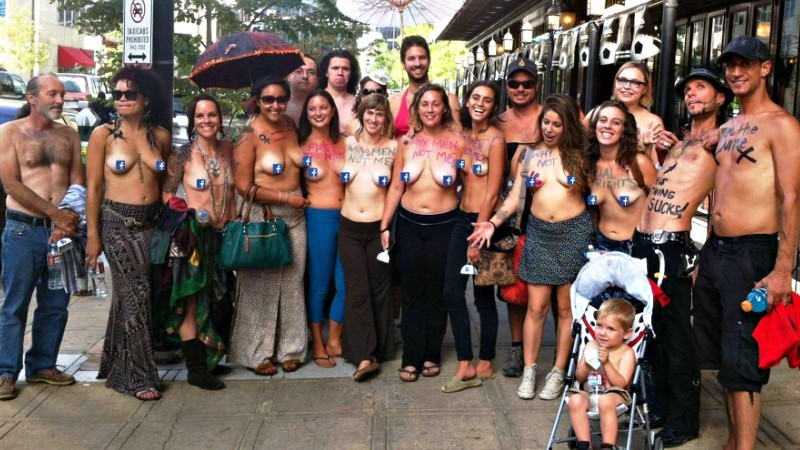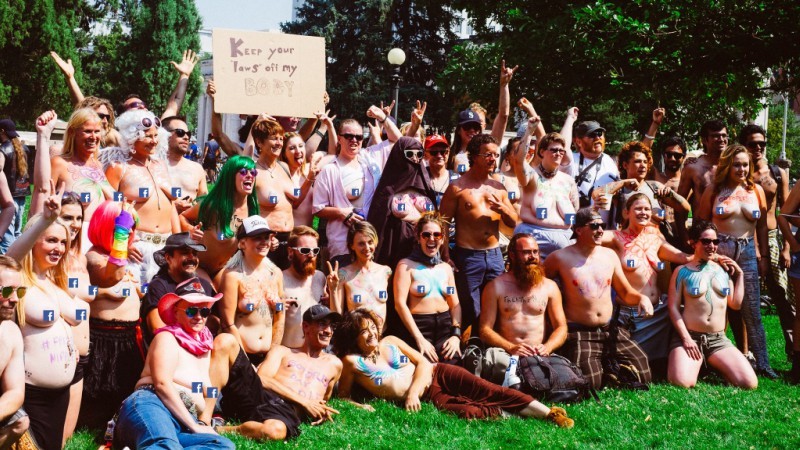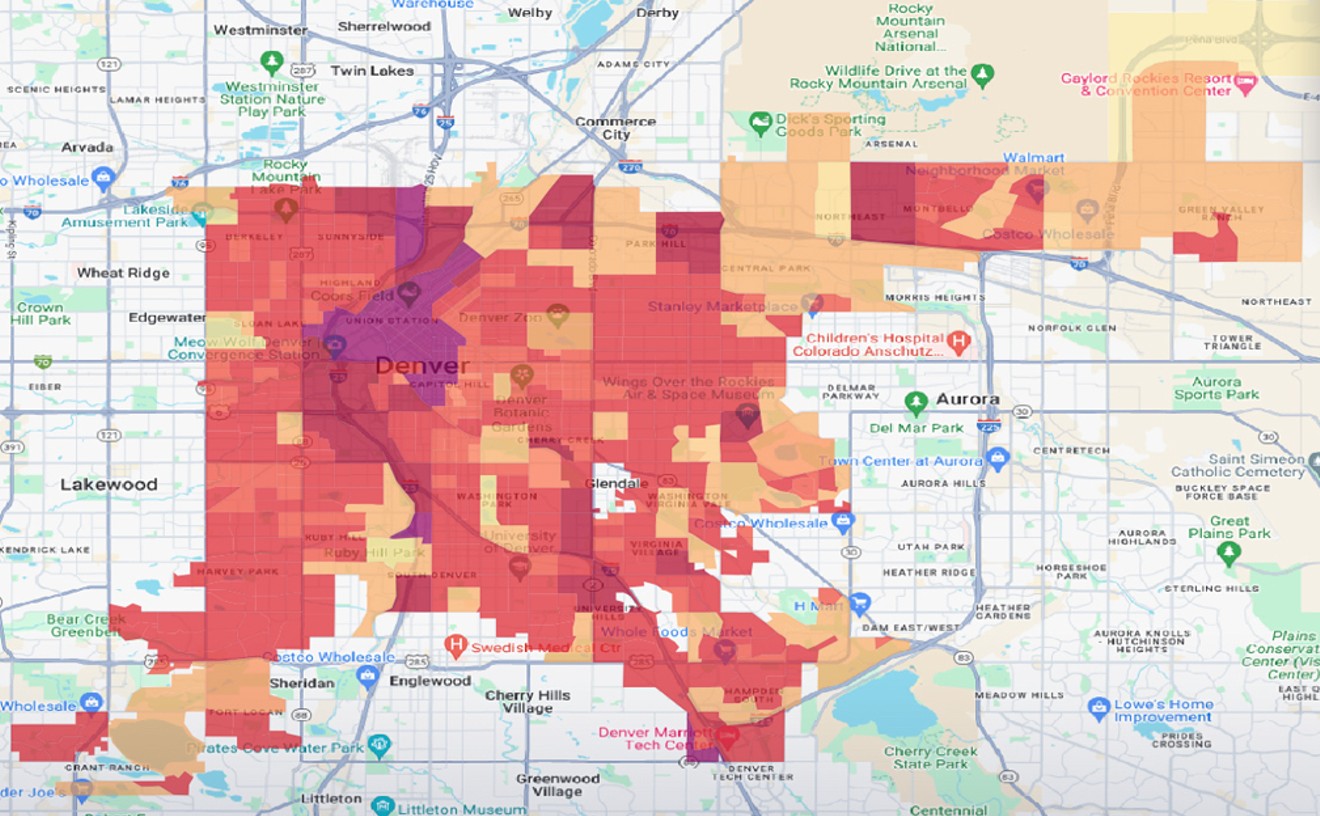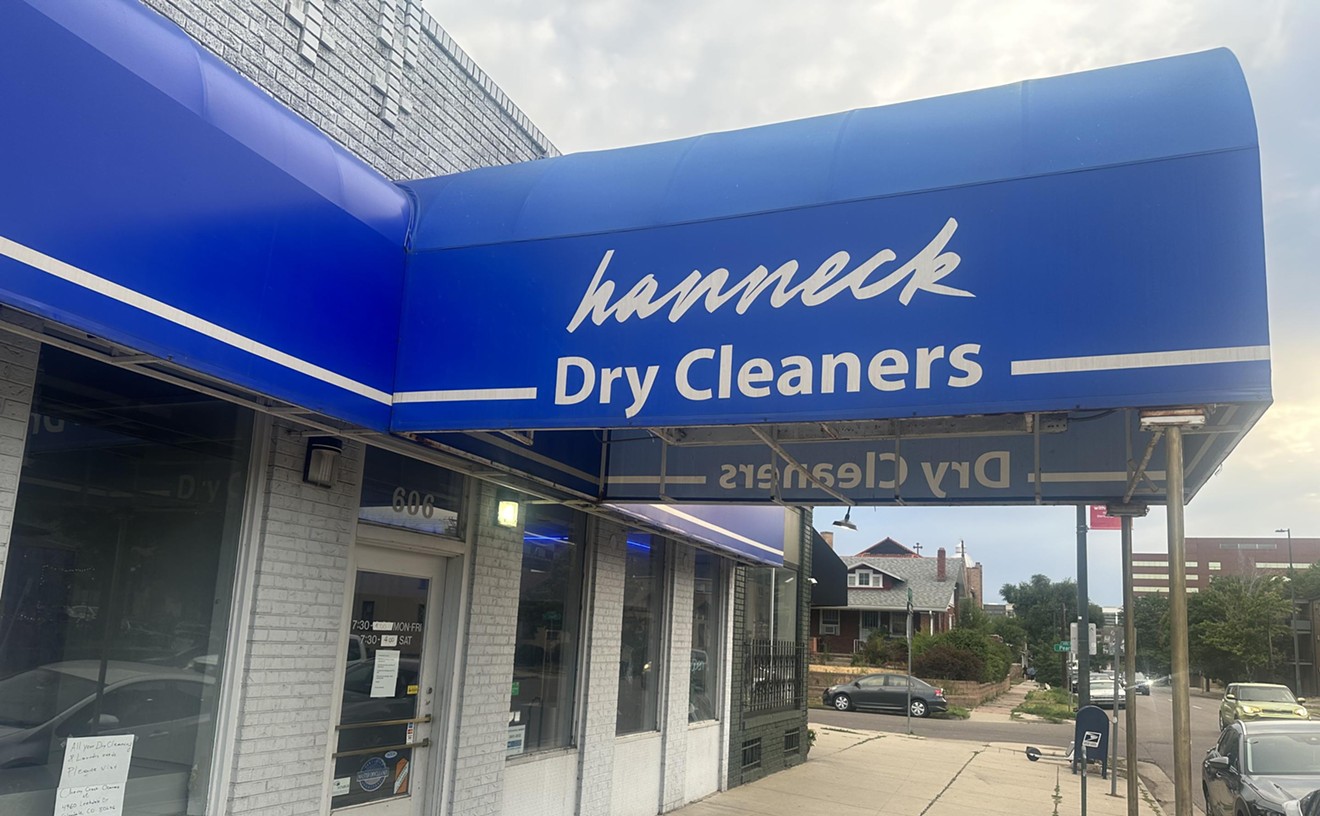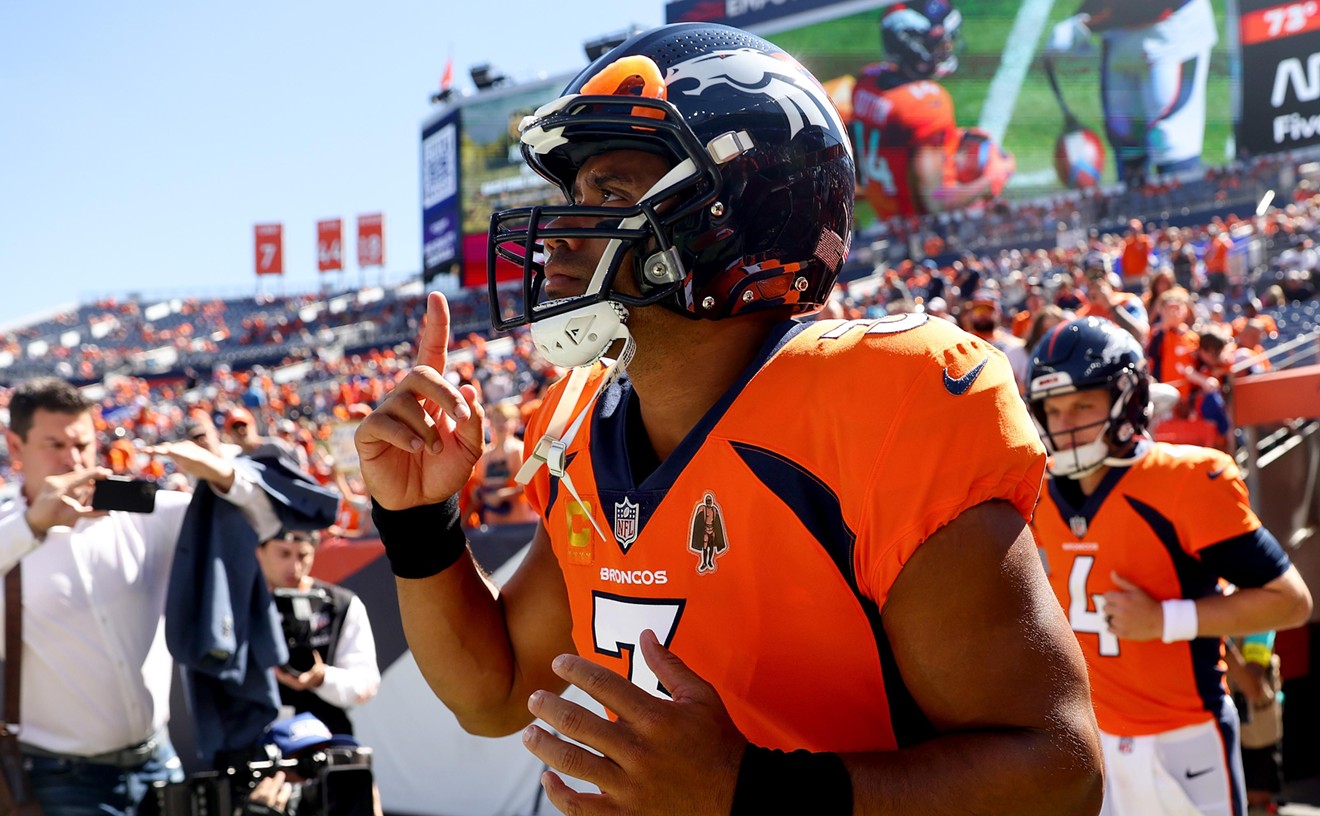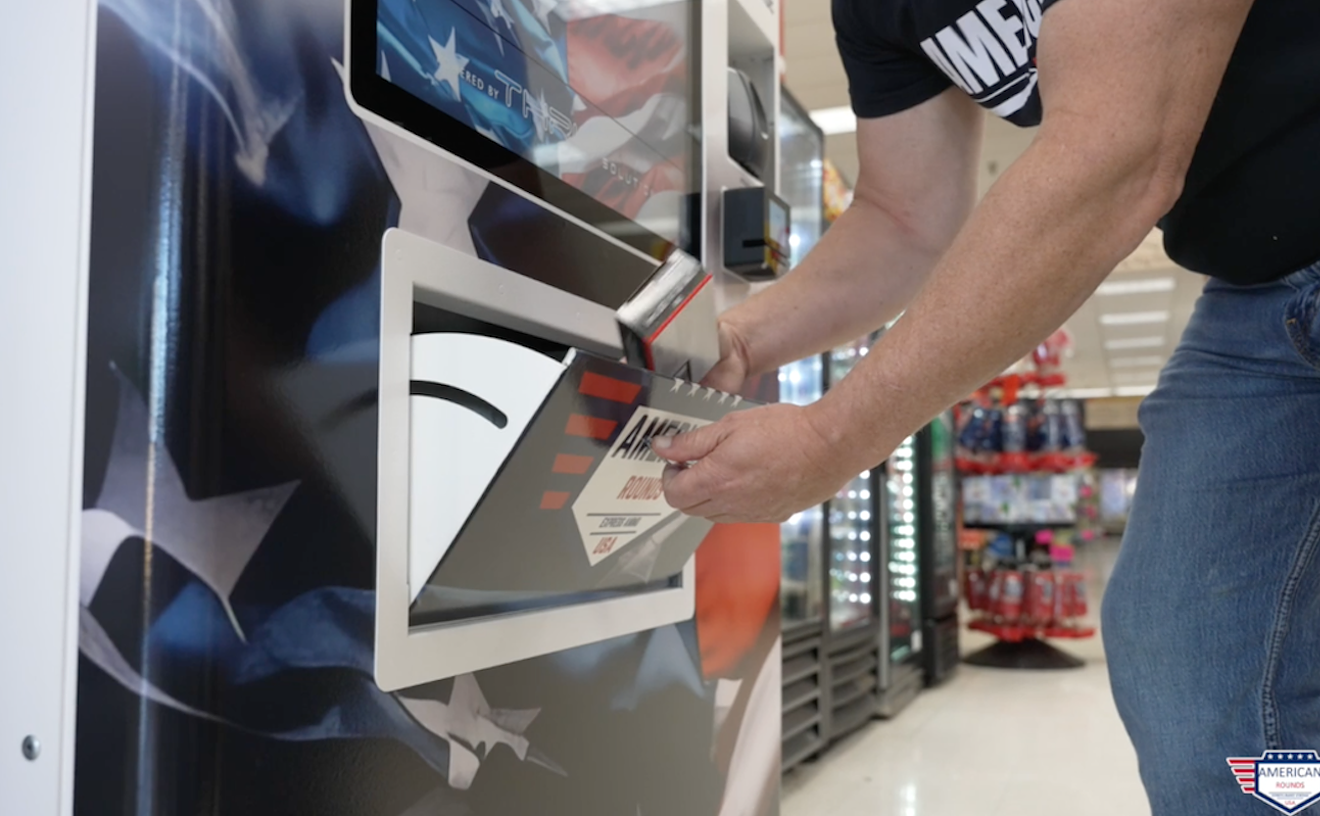We recently asked Matt Wilson, who co-organizes the get-together with Mia Jean, our source for this week's Denver GoTopless Day 2018 preview, to tell us about the background of the event — and he did a lot more than that. He reached out to Bambi McMillan, who put together the first Denver GoTopless Day in 2013, and Adriana Beru, the overseer of the 2014 edition, to get a wide-ranging perspective about what's rapidly become a Mile High City tradition.
Here's the result of our joint conversation, conducted via Facebook Messenger, followed by details about Sunday's Denver GoTopless Day parade and assorted links to learn more.
Westword: Denver Go Topless Day got its start in 2013. What were the inspiration and the goal for the event?
Bambi McMillan: In 2013, I read the story of Phoenix Feeley and about the seven women years before who were arrested for being topless, and I found a link in my reading to gotopless.org. After reading on the site about their goals and being a strong believer myself in full gender equality, I wanted to participate in GoTopless Day as well. Then I realized that we weren't involved yet in Denver or Colorado at all, and I figured, why not find out how to get our state involved in the movement? So I emailed them.
Our goal was to open Denver's eyes to the fact that women are equals, in every way, and not sexual objects to be censored where men are not. We deserve to have the same rights and comforts as any man, because we are all human, and that's just that.
About how many people took part?
McMillan: The first year we had only about twenty participants. It all happened very fast from my initial contact with gotopless.org to the actual event taking place, and I was admittedly not the best at coordinating things, as I had never done anything like that before. I was rushing to get it in order, lol.
Did the march take place in the same location as the events that have followed, or was there initially a different route?
McMillan: The initial plan was to start in Civic Center Park, and march down the 16th Street Mall. My coordination efforts failed to realize that there was a huge bicycle race going on that same day, and the intersection of Colfax and Broadway, as well as the main area of Civic Center Park, was shut down for the race. We made the best of the situation and did our thing anyway. We started in the smaller portion of the park, the east side, and we marched around the event and to 16th street, and up and down the mall before stopping in Skyline Park. So it seems that the marches have kept on the same basic path it started on.
At the time, was there concern that activists could be arrested or have negative interactions with law enforcement?
McMillan: We were fully informed at the time of the lack of clarity on the topless laws in Denver. I contacted the DA, as well as a lawyer, and all of them said that they couldn't really clarify the law and that everything related to public indecency and public nudity were all sexually based. I was told basically that meant it was up to someone else to decide if we were violating any laws based on if they thought what we were doing was of a sexual nature. So to avoid issues with the police, our female participants kept stickers on our nipples and the men wore bikini tops.
We got no flack at all from any police but were harassed momentarily and followed by a mall security guard, who told us that the police were probably on their way. When I asked why, he stated "something about public nudity." He then also attempted to flag down two motorcycle officers, who ignored him and kept going. That was when he realized that we were not of concern to the police and he left us alone. I was actually hoping for some sort of police interaction and was ecstatic to see how the second year went with their police interaction — and when a video surfaced for the short time it did.
We knew from the jump that we were well within our legal rights and welcomed someone to say otherwise. We did get a lot of looks, as expected, and we also answered many questions asked by people as we were marching, but we didn't really get a lot of negative interactions at all.
The reaction was great, in my opinion. No real troubles, even with the location issue and hurried organization. Lots of attention was gained, and as small as it started, it seems to have made a big impact just looking at where it's grown to now.
The participation in the second Denver Go Topless Day in 2014 grew to about thirty activists. What was behind this growth in numbers?
McMillan: I'm not sure what gained the extra participation year two, as I know that as of four days before GoTopless Day in 2014, there wasn't anything organized as far as gotopless.org knew of. They emailed me to ask if I was doing it again, and I explained that I was unable to organize anything that year, as I was at my mom's side during her battle with breast cancer. I was hopeful that just the fact that it did happen in 2013 put out enough awareness to get someone looking at doing it again in 2014.
Adriana Beru: Once you do something once, it becomes easier to do thereafter. That's my best guess. If people know they're relatively safe and doing something legal, they're likely to engage again.
Was there a different approach to the event in year two, or was it more about building on the concept that was established in 2013?
Beru: I didn’t know anyone who had previously done it. I just wanted to make sure an event happened in Denver, so I was happy to create a Facebook event page for the rally. It’s as simple as I found it to be very important, so I wanted to participate, and my participation happened to come in the form of leading it. I heard about GoTopless online somewhere, and it just clicked for me. I knew I had to participate. I was simply moved by the power behind the action of us owning our breasts as a beautiful part of our bodies that doesn't need to be shunned and regulated. I simply wanted to bring people together who also felt compelled to express those parts of themselves and support one another.
Honestly, I was kind of nervous to lead this event. I had minimal experience in organizing and didn't really know what I was up to. I just knew I wanted to see us come together in Denver for some civil disobedience, awareness and celebration. The event was extremely powerful for me. I was buzzing after the fact. It felt so damn good to be unapologetically in my skin — in public. Everyone was so great.
Were you concerned that activists could be arrested or have negative interactions with law enforcement?
Beru: I wouldn't say arrested, but we did expect to have some sort of interaction with law enforcement at some point. We did know we were legally allowed to be topless in Denver, but that doesn't necessarily translate into law enforcement being up to date with that. I felt there was a lot of power in our numbers. I felt very safe with our crew, and it helped me feel safe and secure in my topless activism.
Why did participants decide it was worth the risk?
Beru: Sometimes when you’re called to do these things, you’re just called to do them.
Matt Wilson: It was my first time attending, so I wasn’t sure about Denver’s statutes and was a little paranoid about police contact, though being male, I knew my risk wasn’t nearly as much as these courageous women. I just have always felt it unfair that men could go topless where women can’t, and as someone who recognizes the distinction between nudity and sexuality, I felt it important to represent men showing their support for the right reasons.

Denver GoTopless Day co-organizer Matt Wilson leading marchers during a previous edition of the event.
In 2015, the number of participants more than tripled, to over 100. What do you think accounts for this growth?
Wilson: Clarity of message and the power of the Internet. I knew that using topless equality as a means to combat objectification would raise some eyebrows, so it was very important to me to illustrate how double standards reinforce and perpetuate hypersexualization and rape culture. I grew up in Denver but had moved a couple hours away, so when Adriana asked me to organize 2014’s GoTopless Day, I knew I’d have to use the Internet to get it done. I created the Facebook event page, carefully crafted and moderated the content, and enlisted Denver locals to spread the word within various communities.
How did positive word of mouth from activists factor in to the growth of participation?
Wilson: Tremendously. There are many people who recognize the double standards women face in society, and virtually all women have stories of being personally objectified, slut-shamed or victim-blamed by self-entitled men (#Smile, #DickPics, #SexSells, #WhatWasSheWearing, #MeToo, etc). This cause is a crucial pivot point for so many frustrations women face. Knowing it encompasses these issues, while enabling them to feel the freedom and empowerment of public toplessness, motivates widespread involvement.
I know that over the years, some members of the public have seen the marches and spontaneously joined in. Did that process accelerate as the number of activists involved grew?
Wilson: There are always more participants in the parade than there are in the group photos. When bystanders recognize what we’re doing and the cause resonates with them so much that they yank off their tops and join in, it’s deeply gratifying. It’s wonderful to witness the courage, empowerment and joy of women going topless in public for the first time. It justifies what we do, and helps motivate us to continue in the face of such a daunting challenge: changing society for the better.
The participation in 2016 took another huge leap to nearly 1,000. Was this surprising, gratifying or both for the handful of people who got the event started in 2013?
McMillan: I'm so glad it did! That was the ultimate goal — open eyes, get this out there.
Beru: It's cool to see how I had a little ripple. Just goes to show that little things can grow big, so just do it. I had no idea what i was doing! Lol.
Were organizers caught off-guard by the huge turnout, or were they ready for it?
Wilson: I’d blown up the event on Facebook, Twitter and various news sites, but I was still amazed at 2016’s turnout. If we’d planned to provide food & drink, we would’ve been overwhelmed. It was good I’d kept the event simple: a gathering at Civic Center Park, a march through 16th Street Mall, then a return to Civic Center Park for a group photo.
What complications, if any, did the larger number of people taking part have on the event?
Wilson: We had body painters on hand, but there was no way we could get everyone who wanted to be painted. Still, they rose to the occasion and we all had lots of fun. On the event page and while addressing the crowd, I’d stressed that this was a peaceful celebration of Denver’s topless equality and instructed them to avoid confrontation, obey street lights and not to block traffic. I’d had prior experience leading troops in the military, so I was conscious of setting a pace that didn’t bunch up the participants too much or leave behind those in the rear.
Did the number of negative interactions go up along with the number of participants, or has it remained quite low even as the march has expanded?
Wilson: I’m paranoid about it every year, but even with the drastic increase in participants, negative interactions have been extremely low. We’ve never had any physical altercations or arrests at our events. In fact, a Denver police chief told me he wished all Denver parades could go as smoothly as ours, since we advocate such non-disruptive interaction and respect for traffic flow.
Last year, the number of activists at Denver GoTopless Day went over 1,000. For you, what were the most notable moments from the event?
Wilson: Watching the park fill up as we were gathering for the march was astounding, the same as when I realized the parade spanned over ten blocks as we marched. The sheer scope of the event simply cannot be captured in a single pic. We had participants of all ages, young and old, all races, religions, gender identities and body types. Also, more parents participated with their kids, illustrating how I’m not the only parent concerned with changing the society in which our children grow. Instead of being scarred by the experience, the kids showed how easily it is to accept that bodies aren’t a big deal and life’s simpler when it’s fair.
Even though the event has gotten so big, does it still retain a connection to that first get-together in 2013?
Wilson: I didn’t know of Bambi’s event until years later, and Adriana moved away from Denver after hers. Theirs were isolated events, yet they helped plant the seeds for what we have today. Adriana handed me the baton, and I just ran with it. If she hadn’t stepped up in 2014, none of what we have today would exist. I will forever admire and appreciate their morality and courage.
In some way, do the people taking part in Denver GoTopless Day feel like a family — and have friendships and other kinds of relationships been formed through it?
Wilson: I met Mia Jean and Brian Gantz through these events, and they’ve become invaluable assets to the cause. Their enthusiasm helps keep me on track, and being sounding boards helps keep me sane during the frenzy of last-minute organizing leading up to the event, lol. They've organized promo shoots, media outreach, grassroots fundraising and more. I tend to be a recluse, but they are dear to me.
What kind of history are you hoping to make with Denver GoTopless Day 2018?
This year, our official DenverGoTopless website has gone online. It includes the rationale for our activism, current parade info, a posting of relevant Colorado statutes and Denver ordinances, a gallery of last year’s event (with prior years’ to come), FAQ, blog and more. There’s also a downloadable pamphlet about the parade, our activism and Denver’s topless equality. The website’s very recent and will grow in time, but it’s a great start and something I’m very proud of.
Thanks to newcomer Mber Rose Love, 2018 will be the first year we’ll have live entertainment, complete with stage and sound system. She and her husband are on board with our message, and her dream is to improve society by promoting love and self-acceptance through topless and clothes-free productions. She has recruited singers, dance performers and a comedienne for this year’s entertainment, and through her nonprofit reNude, she has handled coordination of permits and sub-contracting to provide a food truck, bathroom facilities and waste management. She’s been crucial to the scope of this year’s event as a partner and sponsor, and hopes to continue these types of events going forth.

Denver police officers react — make that don't react — to 2017 Denver GoTopless Day parade participants.
McMillan: I would like to see open eyes worldwide about gender and body equality.
Beru: Honestly, I'd love to see our city growing into a safer place for women. I feel like it translates into self-empowerment, a stronger sense of self, sensuality, and normalizing breasts. There are a variety of layers to it. I'm just happy to see our minds expanding into recognizing bias and acting to eradicate absurd double standards.
Wilson: I want to see a world where if people are chillin’ in the park on a hot summer day, women can go topless alongside men and it not be a big deal. I want body-wash commercials able to have men and women topless without sexualization and scandal. I want TV shows to portray instances of people changing clothes or couples lounging topless in bed together without having to conveniently hide the female chest, to better reflect real life and because censorship fuels obsession and objectification. I want women able to walk alone without fear, knowing that men have overcome previously taught entitlement, having adopted a societal standard where men’s "appreciation" doesn’t override their respect for women’s boundaries (#NoMeansNo and #DickPicsAreTacky). I want a better society for my daughters (and their future children) than what they’ve grown up in. I want a society that values respect more than it does. These are the goals, and we’ll never get there if people don’t work for it.
Denver GoTopless Day is scheduled to take place from 11 a.m. to 5 p.m. on August 26, beginning at Skyline Park, 1601 Arapahoe Street. Click for additional details and to see the Denver GoTopless Day parade brochure.

